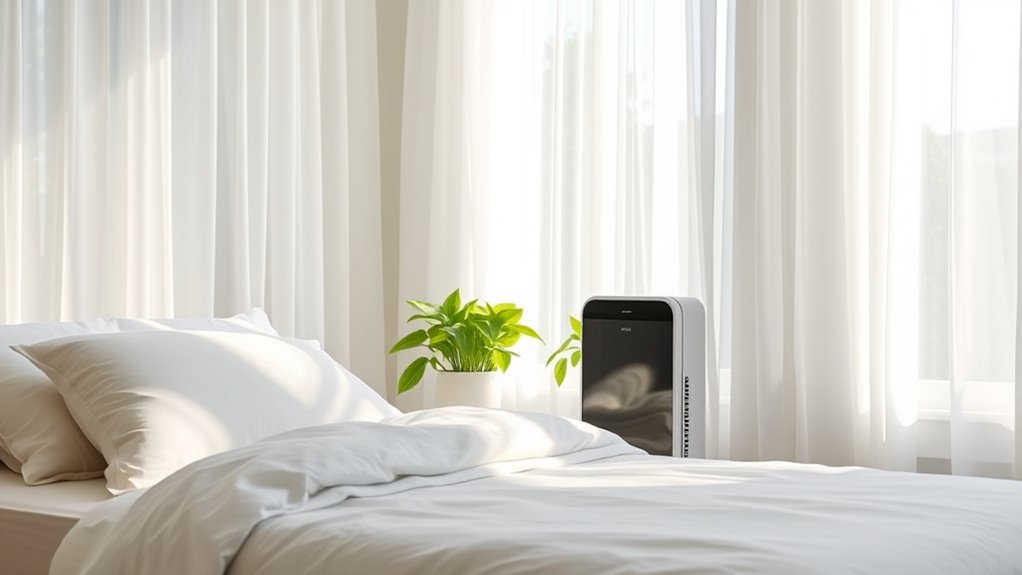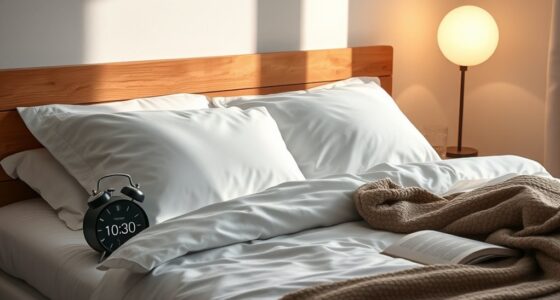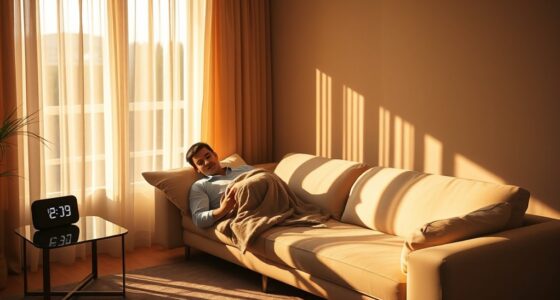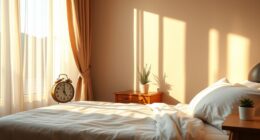Good indoor air quality is key to getting restful sleep and staying healthy. Proper ventilation helps clear out allergens like dust, pet dander, and mold, replacing stale air with fresh outdoor air. Air purifiers with HEPA and activated carbon filters can trap tiny particles and odors, further improving air quality. Maintaining clean, well-ventilated spaces supports better breathing and deeper sleep. To discover simple ways to enhance your sleep environment, continue exploring effective air quality solutions.
Key Takeaways
- Proper ventilation removes indoor allergens and pollutants, reducing congestion and improving sleep quality.
- Mechanical ventilation and air purifiers effectively improve air quality regardless of outdoor pollution levels.
- HEPA and activated carbon filters trap allergens and chemicals, creating a cleaner sleeping environment.
- Good airflow prevents mold growth and airborne irritants that can disrupt sleep and cause health issues.
- Maintaining clean ventilation systems and purifiers supports healthier sleep and overall well-being.

Ever wondered how the air you breathe at night affects your sleep? It’s more important than you might think. The quality of the air in your bedroom can substantially influence how well you rest, and understanding the role of ventilation and purification can make a real difference. Air pollution isn’t just a concern outdoors; indoor allergens and pollutants can accumulate, especially in spaces that lack proper airflow. These airborne irritants can disrupt your sleep cycle, cause allergies to flare up, or even lead to breathing difficulties during the night. When your room’s air is contaminated with dust, pet dander, mold spores, or volatile organic compounds, you’re more likely to wake up feeling unrested or congested.
Poor bedroom air quality can disrupt sleep and cause health issues.
Good ventilation helps clear out these indoor allergens and pollutants. It replaces stale, contaminated air with fresh outdoor air, reducing the concentration of irritants in your sleeping environment. If you keep your windows open or use exhaust fans, you allow fresh air to circulate, decreasing the buildup of indoor allergens. However, in urban areas or places with high outdoor pollution, simply opening windows might not be enough or could even introduce more pollutants. That’s where mechanical ventilation systems come into play. Air exchangers or HVAC systems with proper filters can actively remove indoor pollutants and bring in cleaner air, providing a healthier sleep environment.
Air purification devices are also a key part of improving indoor air quality. HEPA filters, for example, can trap tiny particles including dust mites, pet dander, and mold spores that trigger allergies or asthma symptoms. Using an air purifier in your bedroom can dramatically reduce exposure to these allergens, helping you breathe easier and sleep more soundly. Additionally, activated carbon filters can absorb airborne chemicals and odors, further improving air quality. Remember to maintain your ventilation and purification systems regularly; clogged filters can become breeding grounds for mold or bacteria, defeating their purpose.
Creating a well-ventilated, clean environment isn’t just about comfort—it’s about safeguarding your health. When you prioritize good air quality, you’re reducing your exposure to indoor allergens and air pollution that can disturb your sleep. This, in turn, leads to more restorative rest, better immune function, and overall well-being. So, take a moment to assess your bedroom’s airflow and consider investing in ventilation and purification solutions. Your sleep—and your health—will thank you.
Frequently Asked Questions
How Does Humidity Affect Sleep Quality Related to Air Quality?
Humidity effects can considerably impact your sleep quality by causing sleep disruption. When the air is too dry, it can lead to dry skin, irritated eyes, and a sore throat, making it hard to relax. Excess humidity, on the other hand, promotes mold and dust mites, which also disturb sleep. Maintaining ideal humidity levels helps you breathe easier and enjoy more restful, uninterrupted sleep.
Can Plants Improve Indoor Air Quality for Better Sleep?
Think plants can’t make a difference? Think again. They benefit your sleep by improving air quality through natural air purification. Many houseplants, like snake plants and pothos, absorb toxins and release oxygen, creating a fresher, healthier environment. This boosts your sleep quality by reducing indoor pollutants and increasing humidity naturally. So, adding a few plants not only brightens your space but also helps you rest better through their air purification benefits.
What Is the Best Type of Air Purifier for Allergy Sufferers?
You should choose an air purifier with HEPA filters and activated carbon. HEPA filters effectively trap airborne allergens like pollen, pet dander, and dust mites, providing relief from allergy symptoms. Activated carbon absorbs odors and chemical pollutants, further improving air quality. Look for a model with a high CADR rating and certified HEPA and carbon filtration to guarantee maximum allergy relief and cleaner indoor air for better sleep.
Do Air Quality Levels Vary by Season and Impact Sleep Differently?
Imagine you notice poorer sleep during winter, when seasonal pollution increases, and indoor air fluctuations worsen. Yes, air quality levels do vary by season and can impact sleep differently. Cold weather often traps indoor pollutants, making air feel stuffy, which disrupts rest. Conversely, cleaner summer air might improve sleep quality. You should consider adjusting ventilation and purification strategies seasonally to maintain best indoor air and support better sleep year-round.
How Quickly Can Ventilation Improvements Improve Sleep Quality?
Ventilation speed can considerably enhance your sleep quality within just a few days. When you improve airflow in your space, it helps clear indoor pollutants and regulate humidity, creating a healthier environment. This, in turn, promotes better sleep by reducing disruptions caused by poor air quality. Consistent ventilation improvements quickly lead to sleep enhancement, making your nights more restful and invigorating. You’ll notice the benefits as your sleep patterns stabilize and breathing becomes easier.
Conclusion
Think of your bedroom as a garden, where fresh air is the sunlight that helps your sleep blossom. Just as plants need clean water and good air to thrive, your body needs proper ventilation and purification to rest peacefully. When you prioritize good air quality, you’re tending to your personal oasis, allowing restful nights to flourish. Keep the air flowing and purified—your sleep and well-being will thank you for nurturing this essential environment.








